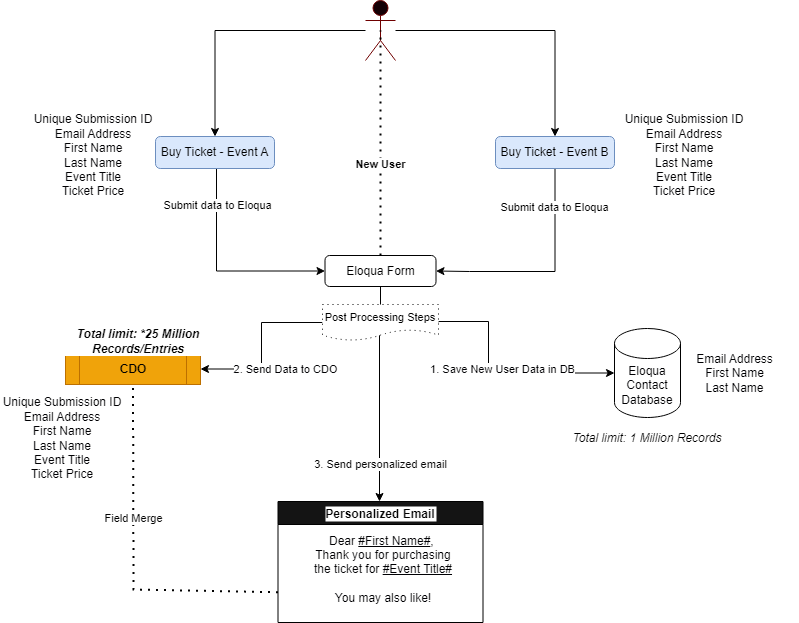On Oracle Eloqua, Custom Data Objects [CDO] play an important role because they allow you to store 25 million entries.

If you already have Eloqua you might be aware that it only allows a certain number of records in the Contacts database/table and that depends on the package that you go with. Let’s suppose it’s 1 million. The size of your contacts database will also grow as you enhance your application, and Eloqua Contacts won’t be able to handle all the information.
With the help of CDO, you can store a large set of data in an organized manner. You can have one-to-one or one-to-many relationships. you need to set any unique field as a Key so with the form submission you need some Unique ID. For a one-to-one, If you set an Email Address as a Unique ID – then the system will always update that same email address record with the new set of updates. For a one-to-many, If you set the Submission ID as a Unique ID – the system will always add the new record. You’ll have an option to set the Unique Code Field which will define that an entry is of a specific Email Address. In the above diagram, I’ve shown a one-to-many relationship.
Let’s understand the above diagram:
Total allowed limit for Eloqua Contacts: 1 million
Total allowed limit for CDO: 25 million
Recommended limit in each CDO: 5 million
There is a maximum limit of 1024 fields in a single custom object.
User purchase the ticket for Event A, and data will go to your Back End. In the Back-End a system will generate the Unique ID. All the details will be submitted to Eloqua Forms via Eloqua Forms API. On the form, we define 3 Post Processing Steps.
– Save data to the Contacts database (Email address is the Unique ID by default in Eloqua)
– Send data to CDO (Submission ID is the Unique ID). You can set any field as a Unique ID in our case Submission ID is the best Unique ID for the CDO which will be unique on each submission.
– Send Email
Eloqua handles Form Post-processing steps in a very intelligent way. All the steps will be performed sequentially by Eloqua and a personalized email will be sent to a user.
Now, some other day if that user purchases the ticket for Event B then the respective process will be followed and a user will receive a personalized email for event B accordingly.
As you know with Eloqua Forms we have Post Processing Steps similarly CDO also provides an option to add Post Processing Steps and has the following options. The only drawback of CDO is the interface. It has a traditional user interface and sometimes becomes hard to use. Otherwise, it is a very powerful feature available on Eloqua. We use CDO for User Registration where we send an Activation Token to CDO and generate a unique personalized email containing the Activation Token link for each submission on a specific form. This is one of the best use cases we have using CDO. If you are using Oracle Eloqua there can be many good use-cases where you can make use of CDO and bring more business value.

As you can see, this is only a high-level overview of Custom Data Objects. There are many more options available if you want to go into more detail. If you have any questions or feedback, please leave them in the comments.
Useful links:
https://docs.oracle.com/en/cloud/saas/marketing/eloqua-user/Help/CustomObjects/CustomObjects.htm
https://www.relationshipone.com/blog/oracle-eloqua-custom-object-cdo-services-part-1/